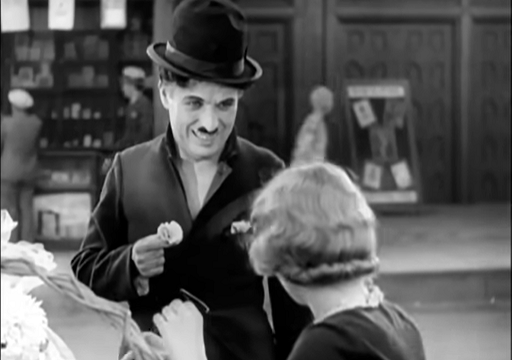Of the three silent comedy greats, Charlie Chaplin had the best sense of the iconic. I think Keaton was funnier and Lloyd the better storyteller, but I can’t deny that Chaplin had the best sense of what imagery an audience would remember and what an audience would sympathise with. Everyone in silent comedy intuitively understood that cops getting kicked in the ass is hilarious, but Chaplin could double, triple, quadruple down on that image. In discussing Curb Your Enthusiasm, beloved Soluter Miller has frequently built off the observation that Larry David is so rich that he fundamentally never has to work again, making all his schemes and problems sympathetic with emphasis on the pathetic; Chaplin’s character is the other way, not just hard up for cash as any of his silent comedy peers but a straight up Tramp, always looking for somewhere to sleep, always taking painful and humiliating work when he can get it, always looking for basic comfort.
And then he compounds it further! In City Lights, the Tramp isn’t just in love with a woman, he’s in love with a blind woman hard up on the rent. It’s impossible for me not to read my understanding of disability politics into the film; her blindness is played for laughs, and she’s more of an object for the hero to save than a character, and her happy ending is to be cured of her blindness. I don’t want to suggest that’s unimportant when I say it fascinates me that Chaplin would pile this on top of everything else; Safety Last! has a better character in how the Girl is a romantic to the point of being a bit of a ditz, but the idea of a blind gardener short on the rent sticks in the mind much more strongly.
This gift for telling an audience what they want to hear is usually the heart of financial success in art. While accusations of ‘nerd blackface’ are embarrassing, The Big Bang Theory was very obviously successful in large part because audiences recognised the behaviours and mentalities the characters presented and felt it flattered their preconceptions of, amongst other things, nerds. But this attitude doesn’t necessarily have to be as pandering and obvious; I fully believe a large part of the commercial and critical success of my beloved Always Sunny comes down to it presenting fairly banal behaviours that any idiot can recognise as wrong, no negative connotations intended. I love difficult and abrasive works, but they also tend to, at best, take a while to find their audience – HP Lovecraft made deliberately offputting art and only saw wide appreciation after he passed away; Metal Gear Solid 2 remains critically underrated whilst its sequel is widely beloved. It’s flattery like Chaplin achieves that gets you loved, and the hope is to have the craft to back it up.

